Today is National Caregiver Day
Every person’s journey with PF is different, and so are the experiences of their family caregivers. Below are the stories of four caregivers, looking after three family members. Maybe you’ll recognize some similarities to your own situation. We hope their stories give you insight and hope and help you cope and thrive while being a PF caregiver.
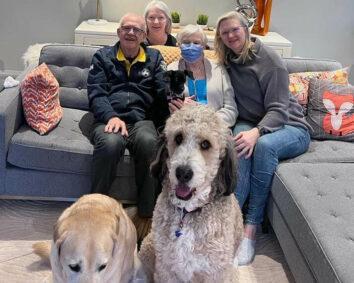
Brian and Suzanne share how they, and the other members of their family, have literally moved closer together to support their wife and mother as she waits for a lung transplant in Toronto. Read the Hurding Family Story.
Members of the Hurding family gather for a photo just before Anne returns to the hospital on March 24. From right to left: Brian, Lorraine, Anne (with dog Lilly on her lap) and Suzanne. Camera-shy dog on left is Bear and Suzanne’s dog Sam is front-right.

Jack is the primary caregiver for his wife Pat in a small town in Ontario. He shares how he cares for her and himself to live their best life together.
The couple in Sedona, Arizona, with their standard poodle Bailey.
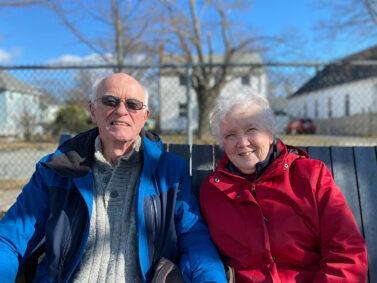
Community ties in Nova Scotia and an extended family help Carolyn and her husband Dale, whenever they need it. They are fortunate that Dale’s disease progression has been very slow and they are still able to live a good life.
Dale and Carolyn enjoy the spring sunshine on a park bench.
CPFF resources for caregivers
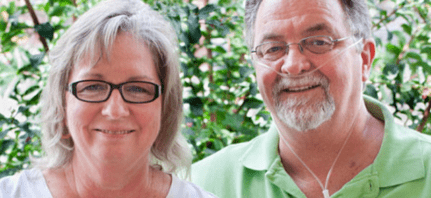
To help caregivers cope and thrive, CPFF hosts a virtual Caregiver Support Group, with facilitators to help you share tips and experiences. You need to register each time you wish to attend this group. The next one is on April 10 from 7 to 8 p.m. EST. Listings for future dates can be found on our events calendar. And remember, your can also join your loved one at our patient support groups meetings.
Just in time for National Caregivers Day, CPFF has added a Caregivers page to it’s website, with resources just for caregivers. You’ll find helpful videos and webinars, links to other organizations supporting caregivers, stories about how others are navigating the PF caregiver journey and an opportunity to share your caregiver story too. Of course, our website at www.cpff.ca always has lots of news and information to help you and your loved one manage your PF journey.
Celebrate your caregivers today and any day
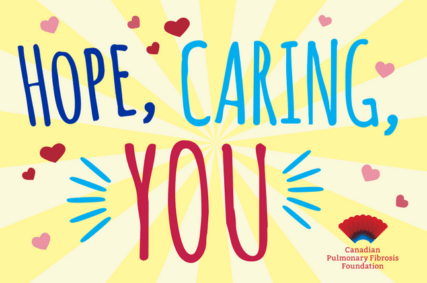
Today’s the day to applaud and thank anyone who helps you manage your life with pulmonary fibrosis: family members, friends, neighbours and people in your community. You’ll find a series of free thank you cards that you can email to them to show your appreciation.
Send a free e-card to someone you want to thank on National Caregivers Day – or anytime.

Caregiver webinars from Carers Canada
Carers Canada, a national coalition dedicated to increasing recognition and support for caregivers, is featuring three complimentary webinars for caregivers today:
- Valuing the Voice of Caregivers and Patients, 10 to 11 a.m. ET
- Grief from the First Step (not only after a loved one passes), 12 to 1 p.m. ET
- Conversations Throughout the Journey, 1:30 to 2:30 p.m. ET.
Visit the webpage above to register.
Feds announce funding to help pay for rare disease drugs
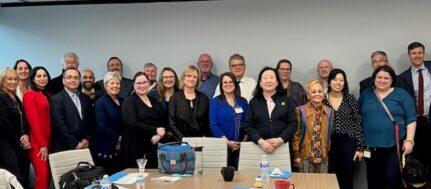
On March 22, the Federal Health Minister Jean-Yves Duclos, announced funding of up to $1.5 billion over three years for a National Strategy for Drugs for Rare Diseases. The funds are to help increase access to, and affordability of, effective drugs for rare diseases. Pulmonary fibrosis is considered a rare disease in Canada, affecting about 30,000 people.
The government will be negotiating with each province and territory to develop cost-sharing, bilateral agreements to improve access to new and emerging drugs, as well as support enhanced access to existing drugs, early diagnosis, and screening for rare diseases. This should help patients with rare diseases get access to treatments as early as possible.
A priority will be to “prevent the postal code lottery,” that now exists for access to some rare disease drugs, said the minister, during the news conference in Montreal. Families should not have to move to another province in order to have access to the medications they need. The bilateral agreements will work to ensure consistent access to rare disease medications across the country.
While most of the new funding will be directed to providing medications, $33 million will go to the Indigenous Services Canada’s Non-Insured Health Benefits Program to help First Nations and Inuit people living with rare diseases.
Another $68 million will be used as follows:
- $20 million over three years to the Canadian Agency for Drugs and Technologies in Health (CADTH) and the Canadian Institute for Health Information (CIHI) to improve the collection and use of evidence to support decision-making;
- $32 million over five years to the Canadian Institutes of Health Research (CIHR) to advance rare disease research with a focus on developing better diagnostic tools and establishing a robust Canadian rare disease clinical trials network; and,
- $16 million over three years to support the establishment of national governance structures, such as a Health Canada secretariat and a stakeholder Implementation Advisory Group, to support the implementation of the Strategy.
How will CPFF engage in the implementation of the strategy?
Last week CPFF Executive Director Sharon Lee joined other members of CORD (Canadian Organization for Rare Disorders) in Ottawa for a rare disease conference and to meet with MPs and public servants about the new strategy and its potential benefits.
“We will be asking for CPFF to be included in the Implementation Advisory Group, which should be assembled in the coming months,” she said. “And along with other rare disease organizations, we are advocating for public transparency on the strategy and the bi-lateral agreements, so that the new funding is spent on new initiatives as intended, and not to offset provincial and territorial rare disease expenses already covered.”
Since the strategy will involve bilateral, cost-sharing agreements between the federal government and each province and territory, CPFF will continue to engage with each of those governments and their health ministries to encourage them to spend these additional funds on initiatives to benefit the PF community.
We will keep you informed of our progress as this new strategy is implemented.
“Hope” is a fitting name for our mascot

Thank you to everyone who submitted a name for our mascot, representing a red blood cell. Hope was the overwhelming favorite, either on its own or in combination with other names. So, we are pleased to announce the name for our mascot is Hope.
“It’s a fitting name, representing the hope shown by the individuals in our Community, despite the challenges they face living with this devastating disease,” says Sharon Lee, CPFF Executive Director. “We look forward to sharing Hope with you all in a series of inspiring vignettes throughout the year.”
Hope will be joined by a character named Ollie, a good friend who represents oxygen. Together they will journey life’s tough and bright moments together and bring positivity and inspiration to our PF Community. Find more Hope & Ollie adventures on the new Hope & Ollie webpage.
Make your next social gathering or personal challenge into a fundraiser
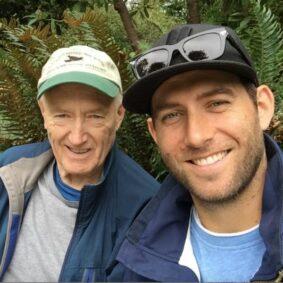
Not many of us are comfortable asking our family or friends for money. But, when it’s for a good cause, and you enjoy hosting events or activities for others, it’s easier than you think. And your event doesn’t have to be a walk or run. Start with CPFF’s Do-it-Yourself (DIY) Fundraiser Kit.
As you begin making plans for spring and summer gatherings once again, consider making your event a CPFF fundraiser. It could be a garage sale, an anniversary, birthday, or graduation celebration. Maybe it is a neighbourhood barbeque, family reunion or sporting event. When people ask what they can bring, or how to help, let them know they can make a donation to CPFF.
Some people have asked their friends and colleagues to sponsor them by making a CPFF donation when they undertake a challenge on their own, like a marathon, or climbing a mountain. Yes, climbing a mountain!
That’s what Skott Taylor did when he climbed Mount Kilimanjaro in February in memory of his father Clare ‘Charlie’ Taylor who lived with pulmonary fibrosis for the last decade of his life. Skott’s campaign raised more than $10,000, which was his goal. You can learn more about Skott’s adventure on our website.
While fundraising to climb a mountain may feel “monumental,” much more modest efforts can make a difference, not just in raising funds for pulmonary fibrosis, but to also raise awareness in your community of this rare and devastating disease.
Think about organizing a group Pucker Up Challenge at your event, to help others realize what it means to live with PF. Breathing should never be hard work, but for people living with PF, it often is. We want the world to know!
What’s happening in the world of PF?

Catch up on the latest news about pulmonary fibrosis, curated to help you keep current and to better understand pulmonary fibrosis, treatments, advocacy, and the latest research. Check out the news items we’ve added to our “PF News” section of the resource library for March.
Recent postings include CPFF’s news release for our rare disease campaign outlining how Canadians with rare diseases, like PF, are at a disadvantage when it comes to healthcare. We’ve also added the Government of Canada’s March 22 media release announcing $1.5 billion over three years in funding to improve access to rare disease drugs. You can read more about this announcement in the second article in this newsletter.
On the research front, there is an interesting article describing how Yale researchers found that removing a microRNA molecule from immune cells prevented lung fibrosis in mice, which has promising implications for treating pulmonary fibrosis.
Finally, an article sourced from the American College of Chest Physicians, describes a new toolkit and video designed for family physicians that could help them quickly identify the potential indicators of ILDs. A strategic partnership between primary care and pulmonary medicine will help improve care and the quality of life for patients who may have interstitial lung disease.
If you come across something noteworthy that we’ve missed, please send it to us at [email protected] and we’ll take a look.
Try out an online exercise program

Shake off the winter blahs by starting an exercise program this spring. Experts agree that regular exercise is essential for those living with pulmonary fibrosis. We’ve got a few online programs and videos that can help you get started and keep going.
Some in our Community are raving about the Breathe Right Exercise Program funded by the BC Lung Foundation. Leading the program is Jill Lommer, an exercise rehabilitation therapist, who is experienced in supporting those living with COPD and other chronic lung conditions. In every class, Jill includes a warm-up, cardio, strength training, and cool down stretches. Suitable for all fitness levels. The program is presented online and includes 85 past videos, with new ones coming out every few days. Work out at home, whenever it’s convenient for you, without exposure to viruses.
You’ll find lots more information about exercise for people living with PF, including a series of frequently asked questions (FAQs) on the topic, as well as other online programs and videos here.
You may also want to ask your specialist about a pulmonary rehabilitation (rehab) program in your community. Many of them moved online during the pandemic and continue to be delivered this way. You can find out more about these programs on our website.
Canadians are taking the Pucker Up Challenge
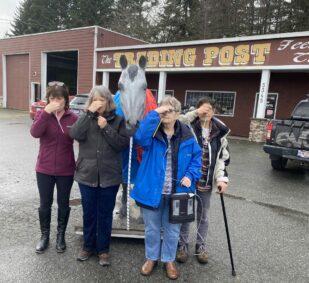
Check out this group of friends at the Trading Post in Ladysmith, British Columbia, taking the Pucker Up Challenge with the store mascot Cantalope, draped in a red and blue blanket (CPFF colours) and equipped with his own “straw,” to support awareness of pulmonary fibrosis (PF).
For people with PF, breathing feels the same as if you tried to get all your air through a straw while your nose is blocked. The Trading Post is encouraging the surrounding community to try the CPFF Pucker Up Challenge for a few minutes to see what it is like to have to work hard for each breath. Encourage your community to take the Pucker Up Challenge.
If you’re gathering with family this holiday weekend, maybe you can all take the Pucker Up Challenge. It’s a great awareness-building activity. Be sure to share your photos and/or videos on social media.
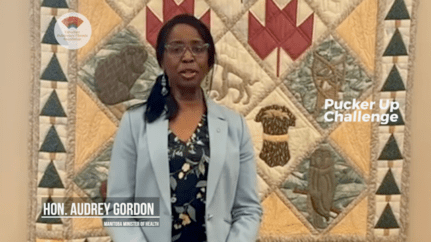
CPFF is also pleased to share a video of Audrey Gordon, Manitoba’s Minister of Health sending greetings and encouragement to those in Manitoba living with pulmonary fibrosis and for the CPFF’s Pucker Up Challenge. Consider asking your MPP or MLA to participate.



